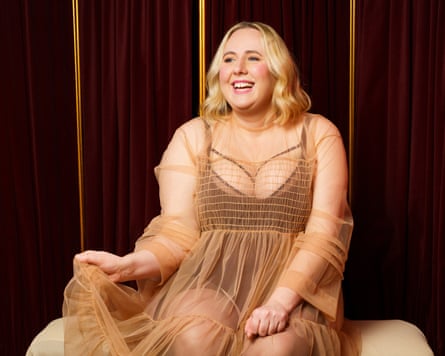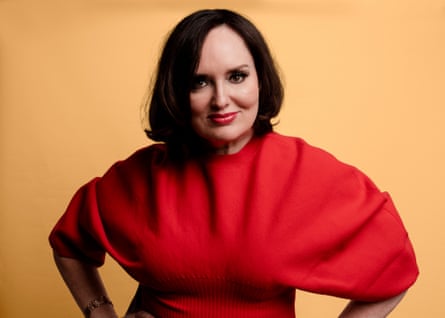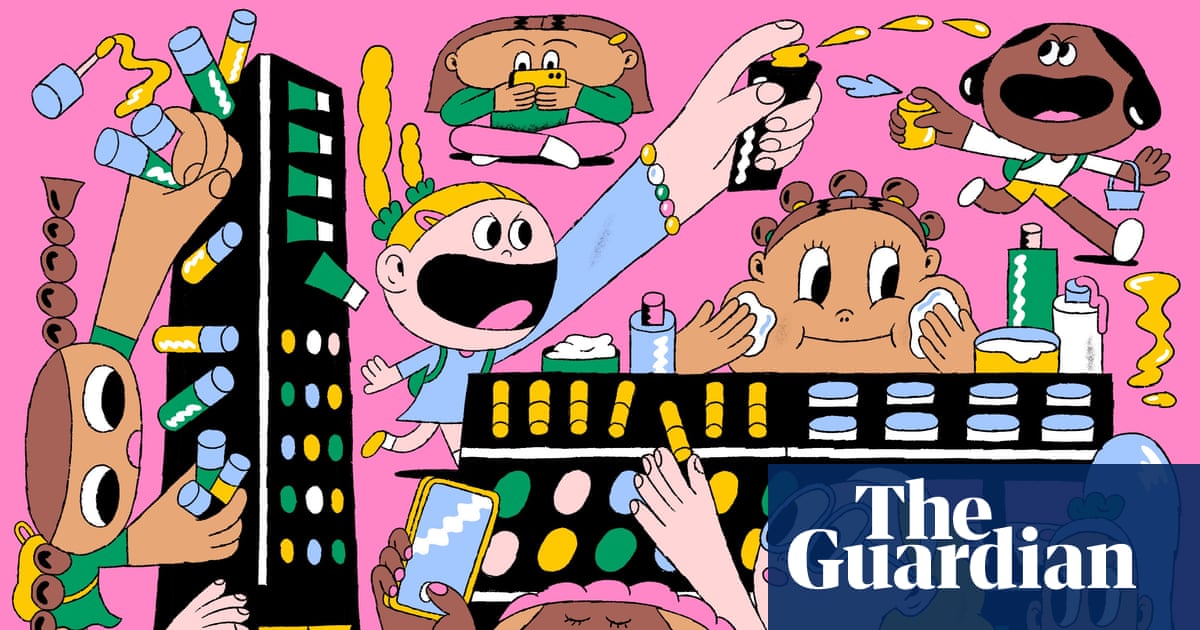‘I can be a bit much,” a friend said to me. A group of us were in a cafe discussing the first date she had scheduled for later that day, and she was worried about how she might come across. It wasn’t the first time I had heard a woman label herself as “too much”, “intense” or “a lot”. I expect even the most feminist of women have found themselves wondering, like the newly single Jessica (Megan Stalter) in Lena Dunham’s new Netflix show, Too Much, whether they would be better off if they just toned it down.
Thanks to the lingering presence of “weirdly archaic feminine ideals”, says the author Amy Key, many women still believe that being “a contained, neat person” will make them more desirable on a date, or at work, or in social situations. “That is linked to the idea of the space that you occupy too,” she adds, whether that’s the metaphorical “space” that you command in conversations or the physical size of your body. The unspoken rule, in both cases, is that less is better.
Trying to contort your body and personality to meet these ideals is “such a pointless exercise”, because in all likelihood you will fail if that’s not who you are, says Key, whose memoir, Arrangements in Blue, is about embracing long-term singleness. “But it’s really hard to not give those ideals authority.” Often, in her experience, others will: she has been told that if she lost weight or stopped doing certain things, then she would be more likely to attract a partner.
The comedian Helen Bauer, whose forthcoming Edinburgh show, Bless Her, is about learning to love yourself, thinks concerns about being too much all come back to society’s “creepy” fascination with youth. From a young age, Bauer, who describes herself as “big and loud”, noticed that boys and men were drawn to “youthful, small women who are quiet and waiting to be told what to do”. When you start interrogating that desire, she says: “It just gets so gross so quickly. Why do you want them small?”
Bauer remembers first feeling she was too much as a child. When her sister had a period of being selectively mute, she remembers people saying it might be “because Helen talks so much”.

Like most hang-ups we have as adults, fear of being too much often has its roots in childhood experiences like Bauer’s, says Lucy Fuller, a psychotherapist. If an exuberant child is consistently told by adults to “pipe down” or “be quiet”, it “very often puts them in a place of shame”, says Fuller, and this can continue into adulthood. It is usually young women who bring concerns about taking up too much space into therapy sessions, she says. Men, on the other hand, “can sit in their ego more confidently” due to cultural norms.
The correct feminist response to all of this, of course, is to embrace being exactly who you are and not worry about fitting into patriarchal boxes. With women’s rights “teetering again all around the world, I’ll be as much as I need to be, and a little bit more, in the face of that”, says Deborah Frances-White, host of The Guilty Feminist podcast and author of Six Conversations We’re Scared to Have.
Poppy Jay, the co-creator of the podcast Brown Girls Do It Too, says the number of times she heard the expression “too much” from Indian relatives growing up “is unreal”. But now, like Frances-White, she wears her “too much-ness” as a “badge of honour”. There are always going to be people who think her podcast – which is about sex and relationships – is too much, “but I’m going to be 40 in a month, and the older you get, the fewer fucks you give”. When it comes to her own dating life: “You should see my Hinge profile – it is too much,” she says, but she likes it that way. “This is the way you weed out the weak links.”
That said, she admits that she does dial parts of her personality up and down in different situations. Most people “can’t handle ‘too much’ girls, so if you want to get laid or you want to get somewhere, especially in work spaces, the sad reality is, you do have to code-switch”.
“I genuinely think the majority of men are just looking for women who will take care of them and not challenge them,” adds Jay. They’ll have sex with a “too much” woman, she says, but they won’t marry her.
Not all men, of course. But men like Felix (Will Sharpe), Jessica’s new boyfriend in Too Much, who are actively drawn to loud, confident women, are “few and far between”, thinks Jay. She and a friend have a mantra, she says, only half-jokingly: “Get them to fall in love with you and then show them the crazy.”
Paradoxically, a certain amount of “crazy” or “messiness” can be seen as cool, with raw, messy aesthetics being popular with gen Z on social media. But there are unspoken parameters attached to this, thinks Key. Although plenty of people enjoy watching a “messy woman” on TV or on social media, she says, some of this comes with an attitude of: “I’m going to consume this as content and find it funny and relatable but I wouldn’t want to be in a relationship with you.”
Key also points to the stock fictional character known as the “manic pixie dream girl”, often the high-spirited love interest in film and TV, who has the same traits as someone who would be perceived as too much, but isn’t viewed that way because of her other stereotypically desirable characteristics. She may be “super-annoying, but is in a slim white cisgender body so it’s kind of fine and acceptable”, says Key.

Jay agrees that certain groups are afforded the privilege of behaving in a way that is too much, whereas others can’t. As a south Asian woman, she says that when it comes to the workplace, she could never behave the way that some white women do in TV shows such as Too Much. Though she makes fun of the way her relatives have wanted her to “be obedient, fall in line”, she recognises that the motivation was often to make sure that she would fit in and be given opportunities.
Tobi Green-Adenowo, wheelchair dancer and founder of the Disabled Power Network, knows that, for some people, just the fact that she is a black woman and a wheelchair user will have already put her in the too much category. She has got used to people using phrases such as “Here comes trouble” simply because she has had to make a certain amount of requests relating to her access needs. For a long time, she used a manual wheelchair rather than a powered one, because the latter’s bigger, clunkier presence was another thing that made her feel she was taking up more space than she should. Though she is a lot more confident now, like Jay, when it comes to work opportunities, she sees the way she presents herself as a balancing act.
“You still want to keep those professional relationships with people, but you do also want to express to them that perhaps they’ve got biases that they may need to change,” she says. “Sometimes I have really bad anxiety over it … How do I approach this without getting blacklisted?”
Frances-White accepts that she will always be too much for some people – she sees it as the cost of being a “dynamic force”, which is what makes her good at her job. “The trick is to know how to dial it up and down – and when to do that.”
As well as that, I suspect a lot of women who think of themselves as being too much need to stop being so hard on themselves. Fuller says she finds it sad that if a social interaction hasn’t gone well, many women look for supposed flaws in themselves, rather than examine the behaviour of the other people involved. Yes, you might have been seen as too much by a certain person or group, “but if you were with another group of people then that might not have been the case”, she says. She encourages her clients to challenge those beliefs about themselves.
Back at the cafe with my friends, one of the women I was with responded to the friend who was concerned about her date. “Women always say to me, ‘I’m too much’ when they’re going on dates with men. But what if you’re not too much? What if these men are just not enough?”

.png) 1 month ago
32
1 month ago
32

















































